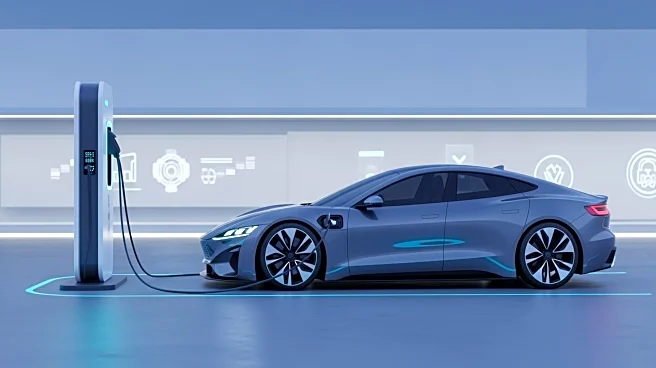What's Happening?
Tesla, Inc. has reported a record-breaking quarter for electric vehicle (EV) deliveries, with 497,099 units sold in Q3 2025. This marks a significant recovery following declines in the first two quarters
of the year. Despite the impressive sales figures, concerns have been raised about the sustainability of this growth. The expiring $7,500 EV consumer tax credit is believed to have incentivized many buyers to advance their purchases, potentially inflating the Q3 numbers. Additionally, while Tesla's revenue increased by 12% year-over-year to $28.1 billion, the company's gross margins have decreased from 19.8% to 18%, and earnings per share have fallen by 37%. Top investor Daniel Sparks has expressed concerns about Tesla's profitability, noting that increased operating expenses, particularly in autonomy improvements, have contributed to the margin decline.
Why It's Important?
The developments at Tesla are significant for several reasons. Firstly, the record EV deliveries highlight the company's ability to capitalize on consumer incentives, but they also raise questions about future demand once these incentives expire. The decline in profit margins, despite increased revenue, suggests that Tesla may face challenges in maintaining profitability as it scales operations. This is particularly relevant for investors who are concerned about the company's long-term financial health. Furthermore, Tesla's focus on self-driving technology presents both opportunities and risks. While there is potential for significant revenue from this segment, the timing and economics of such ventures remain uncertain. The mixed analyst ratings and the high valuation of Tesla's stock indicate a cautious market sentiment, reflecting the balance of optimism about growth prospects and concerns over financial sustainability.
What's Next?
Looking ahead, Tesla's ability to sustain its growth momentum will be closely watched by investors and industry analysts. The company may need to address its margin challenges to reassure stakeholders about its profitability. Additionally, the development and deployment of Tesla's self-driving technology could play a crucial role in its future earnings. Investors will be keen to see how Tesla navigates the transition from supervised to fully autonomous driving, as this could significantly impact its revenue streams. The market will also monitor Tesla's strategic decisions regarding pricing, production, and expansion to assess its capacity to maintain its competitive edge in the EV market.
Beyond the Headlines
Tesla's situation underscores broader themes in the automotive industry, such as the impact of government incentives on consumer behavior and the financial implications of technological advancements. The company's focus on self-driving technology highlights the ongoing shift towards automation and the potential for new business models, such as robotaxis. However, these innovations also bring regulatory and ethical considerations, as the industry grapples with safety standards and public acceptance of autonomous vehicles. Tesla's experience may serve as a case study for other automakers navigating similar challenges.









